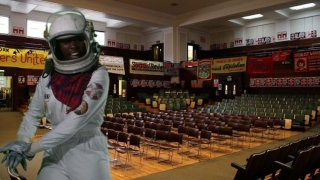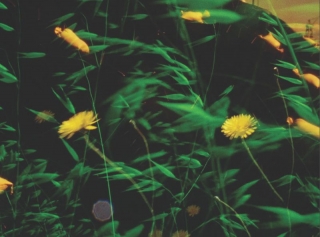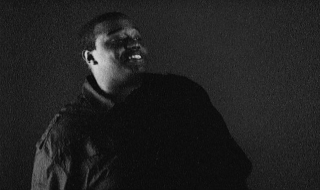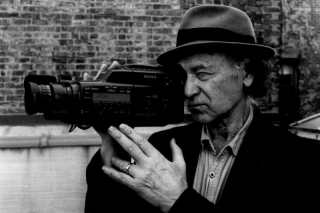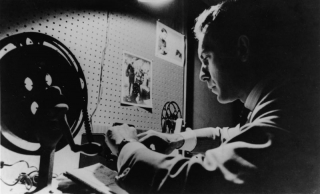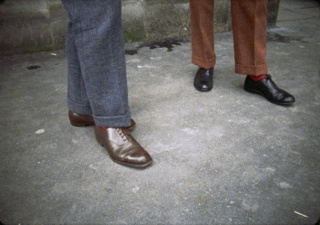Date: 11 October 2012 | Season: London Film Festival 2012 | Tags: London Film Festival
OCCUPY THE CINEMA
Thursday 11 October 2012, at 8pm
London ICA Cinema 1
Ben Russell & Guillaume Cailleau, Austerity Measures, Greece, 2012, 9 min
Athens at crisis point: a colour-separation portrait of the Exarchia neighbourhood during the anti-austerity protests.
Ken Jacobs, Seeking the Monkey King, USA, 2011, 40 min
Amid the hypnotic, flickering motion of a metallic terrain, vitriolic onscreen texts rail against American culpability, from the Revolution to Iraq to the present administration. Each statement casts an arrow, and J.G. Thirlwell’s monstrously cinematic score drives them home.
Brad Butler & Karen Mirza, Deep State, UK, 2012, 44 min
‘An audacious, semi-fantastical secret history of the counterforces of popular protest and clandestine control, this struggle is told through archive material, contemporary footage and future speculation.’
A direct development of the filmmakers’ visit to Cairo prior to the Tahrir Square uprising, Deep State was commissioned by Film & Video Umbrella, and made in collaboration with author China Miéville.
PROGRAMME NOTES
OCCUPY THE CINEMA
Thursday 11 October 2012, at 8pm
London ICA Cinema 1
AUSTERITY MEASURES
Ben Russell & Guillaume Cailleau, Greece, 2012, 16mm, colour, silent, 9 min
A colour-separation portrait of the Exarchia neighbourhood of Athens, Greece, made during the Anti-Austerity protests in late 2011. In a place thick with stray cats and scooters, cops and Molotovs, ancient myths and new ruins; where fists are raised like so many columns in the Parthenon, this is a film of surfaces – of grafitti’d marble streets and wheat-pasted city walls – hand-processed in red, green, and blue. Made as part of a hand-processing workshop at LabA in Athens. (Ben Russell)
www.dimeshow.com
SEEKING THE MONKEY KING
Ken Jacobs, USA, 2011, HD video, colour, sound, 40 min
The film could have well been called ‘Kicking and Screaming’ but that only describes me in the process of making it, questioning its taste. Once the message kicked in it overrode all objection. The piece demanded J.G. Thirlwell’s music, normally way too overtly expressive for me as most of my stuff comes out of painting and is also to be absorbed in silence. Who will even notice visual innovation now, or what’s happening with time? Determining a place between two and three dimensions, pushing time to take on substance, is what I do. Seeking the Monkey King is a reversion to my mid-twenties and that sense of horror that drove the making of Star Spangled to Death. (Ken Jacobs)
DEEP STATE
Brad Butler & Karen Mirza, UK, 2012, HD video, colour, sound, 44 min
The film takes its title from the Turkish term ‘Derin Devlet’, meaning ‘state within the state’. Although its existence is impossible to verify, this shadowy nexus of special interests and covert relationships is the place where real power is said to reside, and where fundamental decisions are made – decisions that often run counter to the outward impression of democracy. Amorphous and unseen, the influence of this deep state is glimpsed at regular points throughout the film – most clearly surfacing in its reflexive responses to popular protest, and in legislated acts of violence and containment, but also rumbling and reverberating, deeper down, in an eternally recurring call-and-response between rhetorical positions and counter-languages, in which a raised fist, a thrown rock, a crowd surge, an occupation, provoke a corresponding reaction in the form of a police charge, a baton attack, a pepper spray, assassinations. A powerful undertow in the ongoing tide of history, this push and pull of competing forces is deftly illuminated in a vivid montage of newly filmed and archive footage. Collided together, past, present and future trace a continuum in which the same repetitive patterns are played out. Against a backdrop of momentous, historically resonant demonstrations, an eternal rioter, or ‘riotonaut’, is picked out, as if by a searchlight, ever-present at each and every flashpoint. On a moonscape, confronted with a picket that becomes a riot, an ur-dictator, the personification of the ‘Deep State’, blurts stupefying, hot-air abstractions of neo-liberalism. Deep State is a film by Karen Mirza and Brad Butler that has been scripted in collaboration with author China Miéville. Commissioned by Film and Video Umbrella. Funded by Arts Council England and London Councils. (Karen Mirza & Brad Butler)
www.mirza-butler.net
Back to top
Date: 20 October 2012 | Season: London Film Festival 2012 | Tags: London Film Festival
NATHANIEL DORSKY & JEROME HILER
Saturday 20 October 2012, at 2pm
London BFI Southbank NFT 3
While others bemoan the end of celluloid, Nathaniel Dorsky – whose work has become an annual highlight of the festival over the past decade – continues apace, more productive now than ever. His carefully considered practice has this year created works of great beauty from a period of sorrow. This screening of two new films will be complemented by rarely exhibited work by his companion Jerome Hiler.
Nathaniel Dorsky, August and After, USA, 2012, 19 min
‘After a lifetime, two mutual friends, George Kuchar and Carla Liss, passed away during the same period of time.’ (ND)
Nathaniel Dorsky, April, USA, 2012, 26 min
‘Following a period of trauma and grief, the world around me once again declared itself in the form of one of the loveliest springs I can ever remember in San Francisco. April is intended as a companion piece for August and After, and is partly funded by a gift from Carla Liss.’ (ND)
Jerome Hiler, Words of Mercury, USA, 2011, 25 min
Jerome Hiler, who shares Dorsky’s heightened sense of wonder at the world around him, builds sensuous layers of superimposition at the moment of shooting. A most private filmmaker, whose primary craft is the less transient medium of stained glass, he has until recently only shown his work as camera originals, thus limiting their public visibility. His inclusion in the latest Whitney Biennial prompted this first digital transfer.
PROGRAMME NOTES
NATHANIEL DORSKY & JEROME HILER
Saturday 20 October 2012, at 2pm
London BFI Southbank NFT 3
AUGUST AND AFTER
Nathaniel Dorsky, USA, 2012, 16mm, colour, silent, 19 min
Nathaniel Dorsky’s August and After is dedicated to two recently departed friends, legendary filmmaker George Kuchar and actress Carla Liss. The film shows them vibrantly, resiliently alive shortly before their passing and then sets off in search of soothing beauty, yielding searing images awash in colours both belonging to and transcending our natural world. Well into the twilight years of 16mm filmmaking, Dorsky continues to present textures and hues that are indispensible to the art of cinema. We will be poorer without them. (Andréa Picard)
www.nathanieldorsky.net
APRIL
Nathaniel Dorsky, USA, 2012, 16mm, colour, silent, 26 min
In my filmmaking I came upon the idea that if I began to arrange images in a certain way, it could transform the ego instead of confirming it. In other words, if you put two shots together to create a solid concept – this is happening, characters getting out of a car and walking down the street, or someone sitting at a window looking – you construct a series of images in such a way that you nurture ego, but then disrupt it through the montage. When you cut to the next shot, there might be a reemergence of presence, but it wouldn’t be a daisy chain back to the previous image, so it wouldn’t solidify the ego. There might be a way of using montage to realize the wisdom of what cinema has to offer. Cinema has great, great wisdom, and it’s very seldom used as a wisdom medium. In a sense, you can nurture the heart in a montage, going from one thing to the next in a way that touches the heart’s intelligence. You can use the energy of the cinema to transform the viewer by letting the viewer rediscover themselves at each moment in the present. (Nathaniel Dorsky interviewed by Ari Spool)
www.nathanieldorsky.net
WORDS OF MERCURY
Jerome Hiler, USA, 2011, video, colour, silent, 25 min
At the very end of ‘Love’s Labour Lost’, as the cast is frolicking around, a messenger comes in to announce a death which brings a sudden shift to the very end of the play. One of the most comical characters, now newly sober, ends the play with a quick dismissal of the audience: ‘The words of Mercury are harsh after the songs of Apollo. You that way – we this way.’Words of Mercury is, if nothing else, economical. It was shot on reversal film and its layers of superimpositions were all shot in the camera. Half of the many fades in the film were made by submerging the original film in a black liquid. The film is silent. The shooting ratio is low and there are areas which are unedited since taken from the camera. I generally shoot first and ask questions later, but I’m struck at the influences that I see in Words of Mercury because they reach back to the very first times that I saw great 16mm films in the early Sixties: Marie Menken, Gregory Markopolous, Stan Brakhage and my lifetime companion Nathaniel Dorsky. (Jerome Hiler)
Back to top
Date: 20 October 2012 | Season: London Film Festival 2012 | Tags: London Film Festival
RITES OF PASSAGE
Saturday 20 October 2012, at 9pm
London BFI Southbank NFT 3
Steve Reinke, Great Blood Sacrifice, USA, 2010, 4 min
‘Whatever is going on on top, there’s a precise machine at work below, and this machine is digging little grooves, and these grooves slowly join together and become the conduits by which all meaning is drained from the world.’ (SR)
Hayoun Kwon, Manque de preuves, South Korea-France, 2011, 10 min
To cleanse his village of demons, the chief of a Nigerian tribe plans to sacrifice his twin sons. One escapes and flees to Europe, where his application for asylum is dismissed through lack of material proof. Using his testimony as the basis, Kwon proposes an animated depiction of his account.
Gabriel Abrantes, Birds, Portugal-Haiti, 2012, 17 min
Pagan folk myth is juxtaposed with ancient Greek comedy as three Haitian girls witness disparate forms of storytelling. An old man tells the tale of his wife’s transformation into a goat. In a local village, an elaborately costumed theatre group performs Aristophanes’ Birds in the original Attic language.
Ben Russell & Jim Drain, Ponce de León, USA, 2012, 26 min
‘Our Ponce de León is an immortal for whom time poses the greatest dilemma – it is a constant, a given, and his personal battle lies in trying to either arrest time entirely or to make the hands on his clock move ever faster. For Ponce de León, time is a problem of body, and only by escaping his container can he escape time itself.’ (BR)
Ben Russell, River Rites, USA-Suriname, 2011, 12 min
‘Trance dance and water implosion.’ A constantly moving camera passes through a complex choreography of bodies engaged in rituals of work and play along the Upper Suriname River.
PROGRAMME NOTES
RITES OF PASSAGE
Saturday 20 October 2012, at 9pm
London BFI Southbank NFT 3
GREAT BLOOD SACRIFICE
Steve Reinke, USA, 2010, video, colour, sound, 4 min
A walk with shaky hand held camera through the landscape of the high desert of New Mexico, down the cliffs to a water reservoir accompanied by Reinke’s voice over. (Argos Arts)
www.myrectumisnotagrave.com
MANQUE DE PREUVES (LACK OF EVIDENCE)
Hayoun Kwon, South Korea-France, 2011, video, colour, sound, 10 min
In Nigeria, to be a twin can be a blessing or a curse. The father of O is the village chief, a witch doctor who believes in the curse of twins. One day, this witch doctor tried to kill his two sons during a ritual ceremony: O managed to escape but saw his brother being murdered. Having fled across his country, he succeeded, by chance, in leaving Nigeria and going into exile in France. In this context, he applied for asylum but his application was refused because he could not produce any proof. (Hayoun Kwon)
BIRDS
Gabriel Abrantes, Portugal-Haiti, 2012, video, colour, sound, 17 min
Three Haitian girls wander through the ripe vegetation and colonial ruins of tropical Jakmel. After listening to an old man’s perverse folk tales they make their way to the town square and see a local staging of a comic masterpiece from ancient Greece; Aristophanes’ Birds. The film’s mysterious intertwining of disparate cultural forms serves as an ode to the potentials of cultural creolization. (Gabriel Abrantes)
mutualrespectproductions.blogspot.co.uk
PONCE DE LEÓN
Ben Russell & Jim Drain, USA, 2012, video, colour, sound, 26 min
‘I could do wonders if I didn’t have a body. But the body grabs me, it slows me, it enslaves me.’
Our Ponce de León discovered the fountain of youth and drank of immortality in the waning moments of his life. In an instant, he became old forever – an 80-year old Spaniard who would continue to walk the earth for century after century after century, watching as coral foundations gave way to mangrove swamps, as swamps were drained and buildings were erected, as buildings decayed and swamps returned. Our Ponce de León is an immortal for whom time poses the greatest dilemma – it is a constant, a given, and his personal battle lies in trying to either arrest time entirely or to make the hands on his clock move ever faster. For Ponce de León, time is a problem of body, and only by escaping his container can he escape time itself. (Ben Russell)
www.dimeshow.com
RIVER RITES
Ben Russell, USA-Suriname, 2011, video, colour, sound, 12 min
A trance dance and water implosion, a kino-line drawn between secular possession and religious phenomena. Filmed in one shot at a sacred site on the Upper Suriname River, the minor secrets of a Saramaccan animist everyday are revealed as time itself is undone. Rites are the new trypps; embodiment is our eternal everything. (Ben Russell)
www.dimeshow.com
Back to top
Date: 21 October 2012 | Season: London Film Festival 2012 | Tags: London Film Festival
WHERE THE MAGIC HAPPENS
Sunday 21 October 2012, at 7pm
London BFI Southbank NFT 3
Peter Miller, Ten Minutiae, Germany, 2012, 5 min
A series of brief exercises in cinematographic magic.
Shumona Goel & Shai Heredia, I am Micro, India, 2011, 15 min
‘Shot in an abandoned optics factory and centred on the activities of a low budget film crew, I am Micro is an experimental essay about filmmaking, the medium of film, and the spirit of making independent cinema.’ (SG/SH)
Kevin Jerome Everson, Rita Larson’s Boy, USA, 2012, 11 min
In one of a trilogy of works based on personalities from the filmmaker’s parents’ hometown, actors audition for the role of sitcom character Rollo Larson. As they attempt to inhabit the character, subtle variations in delivery bring a hypnotic dimension to disconnected lines and repetitive actions.
Erin Espelie, True-Life Adventure, USA, 2012, 4 min
Espelie trains her camera on the myriad life forms that coexist within a small area around a mountain creek. ‘When nature writes the screenplays, she doesn’t abide by crescendos.’ (EE)
Nick Collins, Dark Garden, UK, 2011, 9 min
Contours of light define the flowers and plants of a winter garden, filmed against the black expanse of the night sky.
Robert Todd, Within, USA, 2012, 9 min
‘A film that sustains a complex condition: keeping the inner world alive as the camera looks ‘out’ upon the world.’ (RT)
David Gatten, By Pain and Rhyme and Arabesques of Foraging, USA, 2012, 8 min
An ‘experiment touching colours’ inspired by 17th Century scientist Robert Boyle, bringing together exquisite images shot over a 13-year period. Its title, from a sonnet by Jorie Graham, encapsulates the process and infers its poetic consequence.
Ben Rivers, The Creation As We Saw It, UK-Vanuatu, 2012, 14 min
Unexpectedly given the opportunity to travel anywhere in the world, Ben Rivers chose Vanuatu in the South Pacific. Amidst the villages and landscapes of this remote archipelago, he sought out the creation myths and folktales of a distant culture.
Erin Espelie will give a talk and screening at The Natural History Museum on Mon 22 Oct 2012, at 2:30pm.
PROGRAMME NOTES
WHERE THE MAGIC HAPPENS
Sunday 21 October 2012, at 7pm
London BFI Southbank NFT 3
TEN MINUTIAE
Peter Miller, Germany, 2012, 16mm, b/w, silent, 5 min
Minutiae are ‘little things’. Here are ten. These little things comprise an exhibition exalting the cinema. (Peter Miller)
www.petermiller.info
I AM MICRO
Shumona Goel & Shai Heredia, India, 2011, 35mm, b/w, sound, 15 min
I Am Micro is an experimental film portrait of an anonymous filmmaker struggling to make films against innumerable odds. A stream of consciousness voiceover describes the film artist as a fragile, amorphous being, working in isolation, within a competitive film industry built by businessmen. The film was shot on black and white 16mm at National Instruments Limited, a now defunct factory in Calcutta which once produced cameras. I Am Micro combines lyrical tracking shots of obsolete machinery and dismembered cameras, with behind the scenes footage of an independent film production in Bombay. (Shumona Goel & Shai Heredia)
RITA LARSON’S BOY
Kevin Jerome Everson, USA, 2012, video, b/w, sound, 11 min
Rita Larson’s Boy portrays ten actors auditioning for the role of Rollo Larson in the 1970s TV sitcom Sanford and Son (the American remake of Steptoe and Son). It is one of three films included in the Tombigbee Chronicles Number Two. The series of films is based on famous people and objects from Columbus, Mississippi, hometown of Everson’s parents (the Tombigbee is the river the runs though the city). The actor Nathaniel Taylor, raised in Columbus, portrayed Rollo Larson – Rita Larson’s boy. (Kevin Everson)
TRUE-LIFE ADVENTURE
Erin Espelie, USA, 2012, video, colour, sound, 4 min
When nature writes the screenplays, she doesn’t abide by crescendos but makes up each adventure as she goes along. A rivulet of time encased in a sliver of space reveals an abundance of life, an expression of persistence, and a vision of a world expanding beyond the limits of human attempts to contain or conclude. (Erin Espelie)
DARK GARDEN
Nick Collins, UK, 2011, 16mm, b/w, silent, 9 min
Dark Garden is a short film that captures the ghostly images of the artist’s garden in wintertime, a silent world of ghostly apparitions. Skeletal and silvery plants and their supports are conjured out of the black of the screen as a series of filmic epiphanies. (Cinecity)
WITHIN
Robert Todd, USA, 2012, 16mm, colour, sound, 9 min
Within is a film that sustains a complex condition: keeping the inner world alive as the camera looks ‘out’ upon the world. The film, edited mainly in-camera, dives into an interior that drifts increasingly internally, seeking a sort of cave-like milieu that dissolves into abstraction (forms seen in the dark, lacking firm definition, confusing both scales and distances), and then employs real-time complications to bring this internally-directed way of feeling space along with us as it moves into the outside world, or is it an imagined outer world? The film is a further complication of the perspectival explorations present in my film Undergrowth: rather than looking either at a figure or what some imaginary figure might be looking ‘at’, Within lives in a state that seems to resist perspectival definition, hovering somewhere between what is ‘out there’ and an internally defined image space that sees along with it. The film exists in a space that is at once shallow and deep, layered and reflective, barely there and yet very much alive. It is twilight. (Robert Todd)
www.roberttoddfilms.com
BY PAIN AND RHYME AND ARABESQUES OF FORAGING
David Gatten, USA, 2012, video, colour, silent, 8 min
Fourteen years of foraging, repeated attempts at rhyming, painful process of pruning. A love letter of sorts to Robert Boyle, FRS of The Invisible College and the Royal Society of London for the Improvement of Natural Knowledge, in a visual embodiment of an obscure poetic form known as an ‘exploded Petrarchan sonnet.’ Lines by Jorie Graham in ‘Of Forced Sightes and Trusty Ferefulness’, after Sir Thomas Wyatt, informed both the impulse for the journey itself and destination I ultimately sought. (David Gatten)
www.davidgattenfilm.com
THE CREATION AS WE SAW IT
Ben Rivers, UK-Vanuatu, 2012, video, b/w, sound, 14 min
Three mythical stories from the island nation of Vanuatu, South Pacific, concerning the origin of humans, why pigs walk on all fours, and why a volcano sits where it does. (Ben Rivers)
www.benrivers.com
Erin Espelie will present a free screening and talk in the Attenborough Auditorium of the Natural History Museum’s Darwin Centre on Monday 22 October 2012, at 2:30pm.
Back to top
Date: 21 October 2012 | Season: London Film Festival 2012 | Tags: London Film Festival
FLY INTO THE MYSTERY
Sunday 21 October 2012, at 9pm
London BFI Southbank NFT 3
Laida Lertxundi, A Lax Riddle Unit, Spain-USA, 2011, 6 min
‘In a Los Angeles interior, moving walls for loss. Practicing a song to a loved one. A film of the feminine structuring body.’ (LL)
Beatrice Gibson, Agatha, UK, 2012, 14 min
Strangers in a strange land. As the narrator recounts a dream by composer Cornelius Cardew, the viewer is transported from the hills of Snowdonia to a mental landscape where sci-fi commingles with sexual fantasy.
Lewis Klahr, Well Then There Now, USA, 2011, 11 min
Loosely interpreting a scenario by John Zorn, Klahr uses subconscious logic to weave strands of suspense from collaged images and fragments of voiceover.
Mary Helena Clark, The Plant, USA, 2012, 8 min
‘A film filled with clues and stray transmissions built on the bad geometry of point-of-view shots.’ (MHC)
Janie Geiser, Arbor, USA, 2012, 7 min
The layered imagery of Geiser’s uncanny animations suggest surreal worlds and spectral presences. ‘I was wide awake, in a dream.’
Beatrice Gibson, The Tiger’s Mind, UK, 2012, 20 min
Again referencing Cardew, Gibson’s new project The Tiger’s Mind takes his 1967 text score and applies it to the process of making a collaborative film, for which each contributor assumes the role of a character. The result is an abstract psychodrama and crime thriller set against the backdrop of a modernist house. Commissioned by The Showroom and CAC Bretigny.
PROGRAMME NOTES
FLY INTO THE MYSTERY
Sunday 21 October 2012, at 9pm
London BFI Southbank NFT 3
A LAX RIDDLE UNIT
Laida Lertxundi, Spain-USA, 2011, 16mm, colour, sound, 6 min
A Lax Riddle Unit shows a series of gentle transformations. Each of the film’s turns reveals a surprise: a woman suddenly appearing in bed, and, from behind an album cover, her shy smile. With the film’s elements of Los Angeles landscape, houseplants, and James Carr’s plaintive ‘Love Attack’, continually rearranged like the letters of the title, which is an anagram for Lertxundi’s own name, there is the sense of kaleidoscopic rotation, breathtaking views made with the slightest of movements: changing light, cuts, and slowly revolving camera pans. (Genevieve Yue)
AGATHA
Beatrice Gibson, UK, 2012, video, colour, sound, 14 min
The side of the frame flares out so you know it’s a dream. It becomes apparent that, although similar, there are profound differences between this planet and our own. The most startling is the lack of verbal language. The narrator, our guide to this world, tells us how communication happens, based on interactions with Gladys and Agatha, two beings that confound as they draw the observer in. The names are created for our benefit, and one must wonder if any observations can be trusted, are they all too written, too read from dialogue that isn’t there? What may be certain is the loosening that happens with regard to interpretation. If words cease to have importance then how can the experiences on this planet be readily expressed? Instead of syntax and meaning we are left with rhythm and colour. Based on a dream had by the radical British composer Cornelius Cardew. (Images Festival)
www.dliub.org
WELL THEN THERE NOW
Lewis Klahr, USA, 2011, video, colour, sound, 11 min
An unfaithful interpretation of John Zorn’s early 80’s film script ‘A Treatment For A Film in 15 Scenes’. I consider Well Then There Now a ‘list’ film since Zorn’s text is really a shot list. An exploration of the singularity of the image but, a playful one. Script and Music by John Zorn; Additional Text Lifts from Philippe Soupalt and Alain Robbe Grillet; Voiceover by Slater Klahr.
(Lewis Klahr)
THE PLANT
Mary Helena Clark, USA, 2012, video, colour, sound, 8 min
A film filled with clues and stray transmissions built on the bad geometry of point-of-view shots. (Mary Helena Clark)
ARBOR
Janie Geiser, USA, 2012, video, b/w, sound, 7 min
From a set of photographs found in a thrift store, Geiser creates a liminal space between representation and abstraction, figure and landscape, fiction and memory. Arbor suggests the fragility and ephemerality of memory and its artifacts through subtle manipulations of the photographs: reframings, layerings, inversions, and through the introduction of three dimensional elements, including flowers and thread. The photographs’ subjects are elusive; they rarely engage the camera; they are glimpsed, rather than seen. They look elsewhere, and wait for something inevitable. Gathering on a hillside, lounging on the grass beyond now-lost trees, the inhabitants of Arbor cycle through their one remembered afternoon, gradually succumbing to time or dissolving into landscape, reserving for themselves what we can’t know – and becoming shadows in their own stories. (Janie Geiser)
www.janiegeiser.com
THE TIGER’S MIND
Beatrice Gibson, UK, 2012, video, colour, sound, 22 min
The Tiger’s Mind is an abstract crime thriller set against the backdrop of a brutalist villa. Six characters, The Tiger, The Mind, The Tree, Wind, The Circle and a girl called Amy (the set, the music, the sounds, the special effects, the narrator and the author respectively) battle one another for control of the film as it unfolds on screen. The film explores the relationships between these characters as they emerge and unfold: grappling, wrestling, and dreaming with one another. The Tiger’s Mind is based on an experimental narrative score of the same name, written in 1967 by the radical British composer Cornelius Cardew. Departing from the character-based and improvisatory nature of the score and working with a fixed group of artists for over a year-long period (Alex Waterman as the Tree, Jesse Ash as the Wind, John Tilbury as the Mind, Celine Condorelli as the Tiger, Will Holder as Amy and Beatrice Gibson as the Circle) the film deployed the score as a production structure inviting the participants to develop its varying components: soundtrack, set, special effects, music and text. The resulting piece presents a portrait of its own making in fictional form, extending narrative and character to the production process itself. Tiger’s sets, Mind’s music, Wind’s effects, Tree’s foley, Amy’s narration and Circle’s authorship all knock up against each other in a battle for primacy. (Beatrice Gibson)
www.dliub.org
Laida Lertxundi will screen her work alongside films by Morgan Fisher, Hollis Frampton
and Bruce Baillie at the ICA Artists’ Film Club on Tuesday 23 October 2012, at 7pm.
Back to top
Date: 5 January 2013 | Season: Jonas Mekas
BRIEF GLIMPSES OF BEAUTY: THE FILMS OF JONAS MEKAS (PART TWO)
5—26 January 2013
London BFI Southbank
‘I live, therefore I make films. I make films, therefore I live.’
The Lithuanian poet and filmmaker Jonas Mekas bought his first Bolex 16mm camera within weeks of arriving in the USA as a displaced person in 1949, and from that point onwards he carried it everywhere. Rather than pursuing conventional forms of cinema, he turned the camera towards his own life, recording brief bursts of images that condense his experiences in a unique diaristic style.
The first part of our season, in December 2012, featured Mekas’ earliest films and documented his first two decades in New York. During this time he was at the centre of the New American Cinema, fostering the exhibition, distribution and critical debate of a radical new film movement. In part two we follow the diaries from the early 1970s to the present day, and further programmes explore the collection of Anthology Film Archives, the film museum that Mekas established to showcase and preserve visionary cinema.
As Mekas became less intensely involved with organising the community of filmmakers, a romantic sensibility came to the fore in his work. Nature and family life become principle themes as he raises young children, and on journeys through the city or on trips abroad, he is often drawn to more bucolic subjects.
He began the shift from film to video in the 1980s, but it wasn’t until Letter from Greenpoint that he felt truly in control of the new medium. Shooting on digital enabled a more capacious style of filming, and led to an extraordinary period of productivity. For the 365 Day Project he transmitted dispatches from his new life in Brooklyn, uploading a new short film to his website every day throughout 2007, and in 2011 he completed no less than five feature-length works including the acclaimed Sleepless Nights Stories.
Jonas Mekas’ work is an ecstatic celebration of life, friendship and the arts. His camera and tape recorder have captured momentous cultural events, but also those precious moments which he refers to as ‘Miracles of the everyday – totally insignificant, but great!’
Curated by Mark Webber. With thanks to Jonas Mekas, Benn Northover, Serpentine Gallery and Centre Pompidou. The Jonas Mekas exhibition at Serpentine Gallery continues until 27 January. www.serpentinegallery.org
Date: 8 September 2014 | Season: Gregory Markopoulos: Film as Film | Tags: Gregory Markopoulos
GREGORY J. MARKOPOULOS: FILM AS FILM
8—13 September 2014
New York Anthology Film Archives
“There is no language. There is no art. There is no knowledge. There is but film as film: the beginning and the eternal moment.” (The Intuition Space, 1973)
Gregory J. Markopoulos (1928-92) is one of the most original filmmakers to emerge from the post-war avant-garde. His films, which often translated literary or mythological sources to a contemporary context, are celebrated for their extraordinary creativity, the sensuous use of color and innovations in cinematic form. A co-founder of the New American Cinema Group, Markopoulos was actively involved in nurturing New York’s film community before moving to Europe at the end of the 1960s to pursue a more individual path. Firmly believing that a filmmaker should be responsibility for all aspects of his work, he developed the idea of Temenos, a monographic archive for the preservation, presentation and study of his films.
In parallel to his filmmaking, Markopoulos was a prolific writer whose articles were circulated in journals, self-published editions or program notes. This screening series celebrates the publication of Film as Film: The Collected Writings of Gregory J. Markopoulos, a new book that gathers together some ninety out-of-print or previously unavailable texts by the filmmaker. See www.thevisiblepress.com for more information on the book, and for details of additional events at Light Industry, The Kitchen, Harvard Film Archive and elsewhere this fall.
This is an extremely rare opportunity to see Markopoulos’ earliest works, shown alongside some of the first films made in Europe following his departure from the US in 1967. Robert Beavers and Mark Webber (the editor of “Film as Film”) will be present and the book will be available for purchase at the programmes.
Date: 25 October 2015 | Season: Gregory Markopoulos: Film as Film | Tags: Gregory Markopoulos
GREGORY J. MARKOPOULOS
Sunday 25 October 2015, at 3:45pm
Lisbon Doclisboa at Culturgest
Figura ímpar na história do cinema, Markopoulos abandonou os Estados Unidos, depois de ter sido uma das figuras cimeiras do New American Cinema, vindo, inclusivamente, a retirar os seus filmes de circulação. Na última década da sua vida, dedicou-se a rever e a reeditar os seus filmes desde finais dos anos 1940, num projecto de 80 horas, Eniaios (palavra grega, significan- do “carácter único” e “unidade”), ciclo que, enquanto tal, e como um ritual, se destina a ser visto cada quatro anos, num sítio único, Temenos.
Gregory J. Markopoulos, Gilbert and George (ENIAIOS III – Reel 1), 1975/1989-91, 12 min
Markopoulos retratou artistas como Moravia, Nureyev ou De Chirico. Este retrato da dupla Gilbert & George é marcado pela ausência da imagem interrompida por fragmentos dos corpos destas duas esculturas vivas, e pela ausência de movimento.
Gregory J. Markopoulos, Genius (ENIAIOS – Reels 2, 3, 4), 1970/1989-91, 80 min
Um retrato triplo, inspirado na lenda de Fausto, do artista britânico David Hockney, do pintor surrealista argentino Leonor Fini e do comerciante de arte Daniel-Henry Kahnweiler. Com uma estrutura calculada, Genius constitui a secção central de Eniaios III.
Projecção precedida da apresentação do livro Film as Film: The Collected Writings of Gregory J. Markopoulos, organizado por Mark Webber, com um prefácio de P. Adams Sitney e publicado por The Visible Press (2014).
